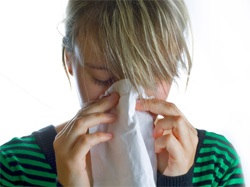Acupuncture Reduces Dust Mite Associated IgE
Kristen Sparrow • May 27, 2016

 The author of this paper presented a poster at the SAR conference in Boston last November. Acupuncture basically “cured” my allergies, so I’ve continued to have a keen interest in acupuncture and allergy and immune response in general.
The author of this paper presented a poster at the SAR conference in Boston last November. Acupuncture basically “cured” my allergies, so I’ve continued to have a keen interest in acupuncture and allergy and immune response in general.
This study compares real acupuncture, with sham acupuncture, and a control group. Only the verum acupuncture showed benefit and reduction in IgE.
Effect of acupuncture on house dust mite specific IgE, substance P, and symptoms in persistent allergic rhinitis.
Author information
- 1School of Medicine, Menzies Health Institute, Griffith University, Queensland, Australia. Electronic address: twindragon@bigpond.com.
- 2School of Medicine, Menzies Health Institute, Griffith University, Queensland, Australia.
- 3National Institute of Complementary Medicine, Western Sydney University, Sydney, Australia.
- 4Health Innovations Research Institute and School of Health Sciences, RMIT University, Melbourne, Victoria, Australia.
- 5Stanford University, Palo Alto, California.
Abstract
BACKGROUND:
Clinical evidence suggests that acupuncture improves symptoms in persistent allergic rhinitis, but the physiologic basis of these improvements is not well understood.
OBJECTIVE:
A randomized, sham-controlled trial of acupuncture for persistent allergic rhinitis in adults investigated possible modulation of mucosal immune responses.
METHODS:
A total of 151 individuals were randomized into real and sham acupuncture groups (who received twice-weekly treatments for 8 weeks) and a no acupuncture group. Various cytokines, neurotrophins, proinflammatory neuropeptides, and immunoglobulins were measured in saliva or plasma from baseline to 4-week follow-up.
RESULTS:
Statistically significant reduction in allergen specific IgE for house dust mite was seen only in the real acupuncture group, from 18.87 kU/L (95% CI, 10.16-27.58 kU/L) to 17.82 kU/L (95% CI, 9.81-25.83 kU/L) (P = .04). A mean (SE) statistically significant down-regulation was also seen in proinflammatory neuropeptide substance P (SP) 18 to 24 hours after the first treatment from 408.74 (299.12) pg/mL to 90.77 (22.54) pg/mL (P = .04). No significant changes were seen in the other neuropeptides, neurotrophins, or cytokines tested. Nasal obstruction, nasal itch, sneezing, runny nose, eye itch, and unrefreshed sleep improved significantly in the real acupuncture group (postnasal drip and sinus pain did not) and continued to improve up to 4-week follow-up.
CONCLUSION:
Acupuncture modulated mucosal immune response in the upper airway in adults with persistent allergic rhinitis. This modulation appears to be associated with down-regulation of allergen specific IgE for house dust mite, which this study is the first to report. Improvements in nasal itch, eye itch, and sneezing after acupuncture are suggestive of down-regulation of transient receptor potential vanilloid 1.

